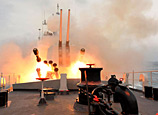
"It will be favorable to all parties, on the condition that Arctic navigation rules are abided," added Tang.
In the meantime, abundant natural resources in the region are attracting more attention from all over the world. It is believed that the Arctic region is rich in oil, gas and other resources, leading some to dub it the "new Middle East."
Tang said he expects that China will be willing to import energy resources from the Arctic region in an effort to diversify its total energy imports.
"China will cooperate with other Arctic countries in energy based on equality, mutual benefit and win-win deals," added Tang.
China's economic cooperation with other states surrounding the Arctic is promising. In April, China signed a free trade agreement with Iceland, the first of its kind between China and a European country.
Experts also refuted some accusations that China hopes to grab and plunder natural resources in the Arctic region and establish a military presence there.
"It is misunderstanding and making mischief," said Qu. "China has no sovereignty claims in the region at all, nor intentions to initiate military activities."
Chinese Foreign Ministry spokesman Hong Lei said Wednesday China recognizes the Arctic countries' sovereignty, sovereign rights and jurisdiction in the Arctic area, as well as their leading role in the Arctic Council.
China respects the values, interests, culture and tradition of the Arctic aborigines and other inhabitants in the region, he added.



















![]()
